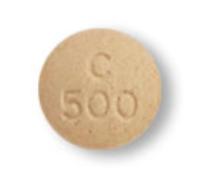Acerola
Generic name: ascorbic acid (vitamin C) [ as-KORE-bik-AS-id ]
Brand names: Acerola, Ascorbic Acid Quick Melts, Cemill 1000, C-Time, Easy-C,
... show all 16 brands
Drug class: Vitamins
What is ascorbic acid?
Ascorbic acid is used to treat and prevent vitamin C deficiency, including scurvy (a condition caused by severe vitamin C deficiency).
Ascorbic acid is also used to support antioxidant activity, healthy tissues and skin, energy storage, heart health, and the immune system.
Ascorbic acid may also be used for purposes not listed in this medication guide.
Ascorbic acid side effects
Get emergency medical help if you have signs of an allergic reaction: hives, difficult breathing, swelling of your face, lips, tongue, or throat.
Acerola may cause serious side effects. Call your doctor at once if you have:
-
kidney problems--swelling, blood in your urine, painful or difficult urination, pain in your side or lower back, feeling tired or short of breath.
Common side effects of Acerola may include:
-
difficult or painful swallowing;
This is not a complete list of side effects and others may occur. Call your doctor for medical advice about side effects. You may report side effects to FDA at 1-800-FDA-1088.
Related/similar drugs
Dextrose
Dextrose information from Drugs.com . Includes Dextrose side effects, interactions and indications.
Ozempic
Learn about Ozempic (semaglutide) for type 2 diabetes treatment, weight management, cardiovascular ...
Coenzyme Q10
Coenzyme Q10 is an alternative medicine used to reduce the symptoms of mitochondrial disorders ...
Warnings
Follow all directions on the label and package. Use exactly as directed. Tell your healthcare provider if you use other medicines or have other medical conditions or allergies.
Before taking this medicine
You should not use ascorbic acid if you are allergic to it.
Ask a doctor or pharmacist if Acerola is safe to use if you have or have ever had:
-
any type of cancer;
-
a planned surgery or any other medical procedure;
-
taken any other medication or have any medical condition;
-
if you are on a low-salt or salt-free diet;
-
if you smoke or chew tobacco;
-
if you drink alcohol;
-
a genetic enzyme deficiency called glucose-6-phosphate dehydrogenase (G6PD) deficiency; or
-
kidney disease or kidney stones.
Ask a doctor before using this medicine if you are pregnant or breastfeeding.
Do not give this medicine to a child without medical advice.
How should I take ascorbic acid?
Use exactly as directed on the label, or as prescribed by your doctor. Do not use in larger amounts, or for longer than recommended.
The recommended daily dose of ascorbic acid changes with age. Follow your healthcare provider's instructions. You may also consult the Office of Dietary Supplements of the NIH, or the USDA Nutrient Database of recommended daily allowances for more information.
Take with a full glass of water.
You must chew the chewable tablet before you swallow it.
Swallow the extended-release capsule whole and do not crush, chew, break, or open it.
Measure liquid medicine with the supplied measuring device (not a kitchen spoon).
Read and carefully follow the instructions for mixing and taking the oral powder.
Mix and stir the oral powder with 8 ounces of a glass of water or juice, or add it to smoothies and drink this mixture right away. Do not store the mixture for later use.
Remove an orally disintegrating tablet from the package with dry hands only when you are ready to use the medicine. Allow the orally disintegrating tablet to dissolve in your mouth without chewing.
Call your doctor if your symptoms do not improve, or if they get worse.
This medicine can affect the results of certain medical tests. Tell any doctor who treats you that you are using ascorbic acid.
Store tightly closed at room temperature, away from moisture and heat.
What happens if I miss a dose?
Take the medicine as soon as you can, but skip the missed dose if it is almost time for your next dose. Do not take two doses at one time.
What happens if I overdose?
Seek emergency medical attention or call the Poison Help line at 1-800-222-1222.
What should I avoid while taking ascorbic acid?
Follow your doctor's instructions about any restrictions on food, beverages, or activity.
What other drugs will affect ascorbic acid?
Other drugs may affect ascorbic acid, including prescription and over-the-counter medicines, vitamins, and herbal products. Tell your doctor about all other medicines you use.
More about ascorbic acid
- Check interactions
- Compare alternatives
- Reviews (8)
- Drug images
- Latest FDA alerts (2)
- Side effects
- Dosage information
- During pregnancy
- Drug class: vitamins
- Breastfeeding
Patient resources
- Ascorbic acid drug information
- Ascorbic acid (Intravenous) (Advanced Reading)
- Ascorbic acid (Oral) (Advanced Reading)
- Calcium Ascorbate
Other brands
Vitamin C, Ascor, Ester-C, Cemill 1000, ... +16 more
Professional resources
Other brands
Related treatment guides
Further information
Remember, keep this and all other medicines out of the reach of children, never share your medicines with others, and use this medication only for the indication prescribed.
Always consult your healthcare provider to ensure the information displayed on this page applies to your personal circumstances.
Copyright 1996-2025 Cerner Multum, Inc. Version: 7.01.

